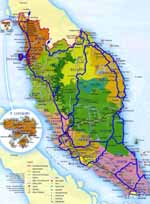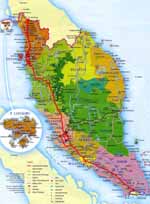| Home
News
Overview
Diary
Statistics
In Deutsch
MAIL

|
Enjoy some pictures of the worldrecordtour, taken in
Malaysia
- Malaysia Map
- First Trip
- 1993/94
|
- Malaysia Map
- Second Trip
- 2005
|
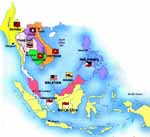
-
- Map of Southeast Asia
|

-
- click a picture to see details
|
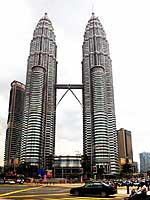
|
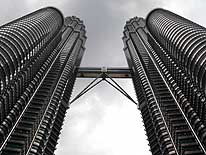
|
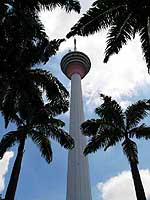
|
- The 1’483 ft. high Petronas-Twintowers
- are the landmark of Kuala Lumpur
…….
|
- ….… and the pride of the Malayan people
|
- Kuala Lumpur’s TV tower (1’381 ft.),
- is the 4th biggest of the world
|
- Malaysia - a multiracial country
-
- September 23rd, 2005:
Selamat Datang – Welcome to Malaysia
-
- “I am really wondering how Malaysia has changed since our first visit in
1993/94”, reflects Emil as we leave behind the easy border formalities at Johor Bahru
and park downtown for changing the remaining Singapore Dollars into Malaysian Ringgits.
Both of us recognize a striking difference already within the first minutes: Today, many
more women and girls are wearing headscarves, i.e. there are many more strict Moslems than
eleven years ago. This impression gets even stronger in the country’s capital of
Kuala Lumpur. In percentage, the Moslem population increased generally from then 40% to
more than 50% now. The second most impressive novelty, which is obvious, is the incredible
big number of new monumental constructions – from highways to huge shopping malls,
from hotels to skyscrapers, from the 1’381 ft. high TV tower to the pride of the
Malayan people – the 1’483 ft. high Petronas-Twintowers - the tallest in the
world until Taiwan has taken over. What still remains the same are the immense palm oil
plantations glittering in the sun that extend on both sides of the highway, the beautiful
mosques with their high rising minarets, the richly decorated Hindu temples, the white
sandy beaches and the impenetrable rain forest. No - we did not change our principle to
explore countries thoroughly just because we are driving the 220 miles on the good, fast
toll highway directly to Kuala Lumpur. It has its special reason: Our memories of all the
visited beautiful places eleven years ago are still vivid and we want to keep it that way,
avoiding eventual disillusionments. Nevertheless, we still want to include them in this
report.
|
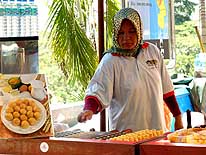
|
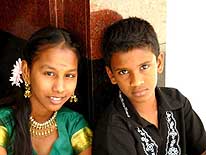
|
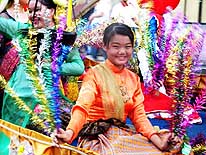
|
- Different nations under one cover:
|
- Moslems
|
- Indians
|
- Chinese
|
| October
1993:
The Kota Tinggi waterfalls and Mersing at the South China Sea
- We hardly trust our eyes as we approach the Kota Tinggi waterfalls 10 miles outside of
Johor Bahru. From one moment to the other, we are surrounded by lush tropical scenery - by
palm and banana leafs, bamboo and huge ferns, golden hibiscus flowers and pink orchids.
And amidst all this exuberant vegetation, the untamed waters of the 112 ft. high cascade
rush in two steps steeply downhill, forming two pools with wonderful clear water just
ready to jump in. Are we not happy people to have discovered already on our first evening
in this new country such an idyllic spot to set up camp? As night falls and the last
screeches of the birds disappear, the jungle awakens with intensive sounds all over. They
keep us company the whole night. Next morning we follow the narrow, bumpy road winding
northwards. Apparently there are so many bends because the road construction companies are
allowed to use the trees, which had to be cut to build a new road, and therefore they show
little interest on a straight course. Endless palm oil, rubber and banana plantations,
which are the main export products of the country, are passing by, interrupted now and
then by a slowly flowing brownish jungle river. Once in a while, we spot a curious monkey
sitting beside the road as we continue to Mersing, a city situated at the South China Sea.
From there, passenger ferries operate daily to the small offshore island of Tioman –
a little tropical but touristy paradise with long sandy beaches under a blue sky. We begin
to dream. 1977 – during a short visit – we spent wonderful moments at this
beautiful place and – despite of all contrary information – we do not want to
accept yet that there is no car ferry crossing over. But unfortunately, in the picturesque
port of Mersing with its exotic junks, our last glimmer of hope soon fades away
definitely.
|
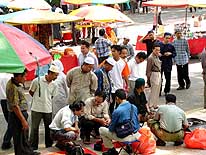
|
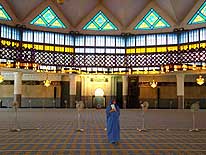
|
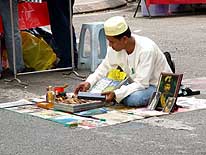
|
- Bargaining at the bazaar in
- front of the State Mosque
|
- Liliana dressed according to the Islamic dress
- code in the modern State Mosque of Kuala Lumpur
|
- A vendor displays religious items
- in the bazaar near the State Mosque
|
| Downtown Mersing reveals the
unique exotic charm of a busy and colorful Asian town. Elderly Chinese ladies walk through
the streets with unemotional faces, protecting themselves with bright umbrellas against
the burning sun. Teenagers on scooters, with headscarves and colorful helmets, rush up and
down. Cars, rickshaws and a never-ending crowd of people push their way simultaneously
between overloaded bazaars and noisy workshops and mingle with the glorious food stalls,
which offer spicy Indian, Indonesian, Malay and tasty Chinese specialties. The food is too
delicious and too inexpensive (around one US$ a meal with rice, meat and one vegetable) to
even think of using our gas stove again. This “Asian face”, which is so
completely new to us, absorbs us in such an extent that we totally forget that we have to
look for a night camp. Only when the skies suddenly darken dramatically and heavy
lightening is all around us, we get aware of it.
|

|
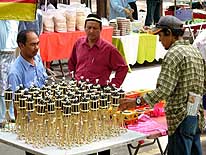
|
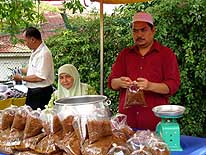
|
- Display of the “fez” - the
- Malayan head cover for men
|
- Torches - made of bamboo
- - attract visitors
|
- A family packing sweets
- into plastic bags
|
| October
1993:
Our little paradise on the land of the Sultan of Johor Bahru and the East Coast
Already a few miles North of Mersing, we discover a picture book spot at the Sri Pantai
Beach. Sea, palm trees and picnic tables. What a wonderful place! But our euphoria is not
for long: Within seconds, we are attacked and tormented by thousands of tiny sand flies
and then we discover also all the scattered garbage around us. This is definitely not what
we are looking for – we move on. Shortly after, we follow an overgrown sandy track
leading to a small meadow directly on the seashore with shady pandanus and palm trees.
There is nobody around. Except of the splashing waves’ soft sound, there is absolute
silence. What more do we want? Once in a while, the distant voice of a muezzin, calling
for prayer, interrupts this tranquility. Just a few hundred steps away, we stumble over
simple tombstones made of plain wood, clay and stone figures without any inscriptions,
which is characteristic for a Moslem cemetery. Islam is the official religion in Malaysia.
But thanks to the freedom of religion, also Hindus, Buddhist and Christians live
side-by-side in tolerance and harmony. According to the state law, senseless quarreling
can be punished with imprisonment.
|

|
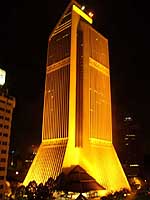
|
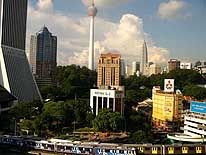
|
- Cultural event at the TV tower
|
- View from the 8th floor of our
- room in the AnCasa Hotel to the
- illuminated Maybank Tower …….
|
- ....... and the TV Tower just beside,
- with one of the Petronas-Twintowers
- in the background
|
| In our neighborhood, we find the
clean Matahari bungalows owned by Linda , a Malay and Tom, an American. They are tiny and
there is just enough space for a double bed. The atmosphere in the small family business
is spontaneous and friendly. We enjoy to visit them in the cool evening breeze and to
listen to their interesting stories regarding laws and customs. Apparently Malays of
Chinese origin are not allowed to buy every land. They do not have the same rights as
their brothers and sisters of Islamic Malayan descent. “Do you want to play Robinson
for a few days”, Tom asks us suddenly with a twinkle in his eyes. He points offshore,
to the small rock of uninhabited land. “I will ferry you over there with only the
most essential items for survival”, he smiles. “And what if something happens
and we have to be rescued”, we ask. “Then you give me a sign with the storm
light I will leave with you, and I will fetch you immediately” he tries to brush
aside our worries. “No thank you Tom, we already found our own little paradise!”
we disappoint him. Later, when we return to our camp at sunset, the way is lighted with
many little fires smoldering under coconut shells to chase away the tormenting insects.
The leafs of the palm trees are dancing in the wind, the air smells of sea, salt and algae
– our “Robinson life” is as perfect a s it can be on this small piece of
land, which apparently belongs to the Sultan of Johor. At the moment, we would not swap it
for anything else in the world.
|
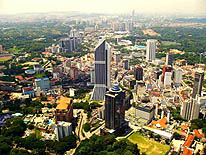
|
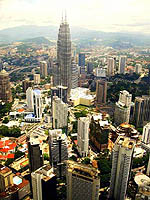
|
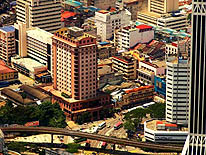
|
Sweeping view
over Kuala Lumpur’s skyline from the platform of the TV Tower |
- to the sloped roof of the Telecom Tower
|
- to one of the Petronas-Twintowers
|
- and “our” orange colored AnCasa Hotel
|
- Every day is getting stickier and muggier and the hourly tropical downpours remind us
that the monsoon is rapidly approaching. It is time for us to head further North. One
morning, we say good-bye not without sadness to our little paradise and stop for one more
time at an abandoned building - which apparently was once a nightclub with Thai girls of
the oldest profession - to fill up our drinking water and to take a shower. Then we hit
the road again. Rainforest and charming untouched villages with wooden canoes floating on
the river, bungalow settlements in tropical surroundings, battered wooden houses on stilts
and little busy shops along the road - all are passing by. Under a shady tree in front of
a hut, a family is plucking headless chickens. Two huge bags of cleaned poultry are
already leaning on one side of the tree, ready for sale. On the other side, chicken in a
much too small cage are cackling nervously - and this is by no means for no reason!
It is a holiday, the birthday of the Sultan of Pahang, when we visit the impressive state
mosque and the lovely bays of the Chempedak beach in Kuantan, before we continue along the
now unattractive East Coast booming with dreary hotel complexes. And still we encounter
many more attention-grabbing billboards announcing future projects. We are looking
desperately for a quiet beach in this commercialized coastal area. Also finding a secluded
nightspot is extremely difficult – there are small settlements all over. Where can we
spend the night? Finally, we have no other choice then to park our car between the bushes
next to simple houses on a busy beach. Most probably, we had just fallen asleep, when Emil
wakes up from the cracking of branches and sees a head appearing right on my window.
Without any warning, he hammers his fist with full force against my window screen and
screams terrifyingly, making me jump up with my heart beating like crazy. I just see the
shadow of a man disappearing in the bushes. After this worrying intermezzo, we do not even
think of going back to sleep again. For security reasons, it has always been and it always
will be our policy to change our night place at such incidences. In a hurry, we pack
together and drive away to the interior, where we have to content ourselves with a
mosquito infested place for the few remaining sleeping hours.
-
|
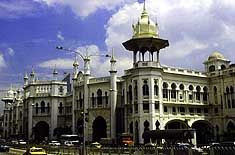
|
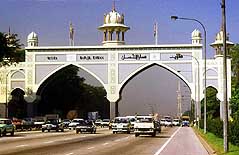
|
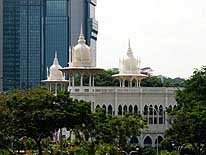
|
- The old Railway Station with its
- many turrets has an appearance
- of “1001-nights”
|
- The white City Gate marks
- the entry of Kuala Lumpur
|
- View from the State Mosque
- to the domes and turrets
- of the Railway Station
|
| October
1993:
Historic Malacca and the West Coast
The West Coast is calling – Malacca, once a flourishing trading post between East and
West. The old quarter still teems with historic, carefully restored buildings from the
past, when alternatively the Dutch, Portuguese and English ruled here. The most impressive
example is the dominant “Stadthuys” in the Dutch colonial style. But also the
Portuguese have left their distinguished traces on many of the remarkable monuments. But
what we enjoy the most is the exotic mixture of richly decorated Hindu, Chinese and
Buddhist temples, where in front of them florists “wave” skillfully white
Jasmine blossoms, red roses and yellow asters into wonderful garlands, and where its
delicate fragrance mingles with the sweet scent of incense. As soon as we leave the town
behind us, we are back in rural scenery. Especially attractive are the traditional Malay
houses - the two-storey wooden houses built on stilts with a big gable roof and a lofty
veranda, looking very noticeable in the tropical environment. The steps leading to the
veranda are made of multicolored tiles with distinguished motifs. Each of them is unique,
and they all are somehow the showpiece of every house. It seems like a competition: Who
has the nicest entrance?
As we approach the town of Klang, we see already from far the four deep blue minarets
rising high towards the sky. They belong to the beautiful Shah Alam mosque, which can
accommodate up to 16’000 people and claims to have the biggest dome of the world. A
striking sight, as its setting is also on the shore of an artificial lake, fringed with
coconut palms and an abundance of frangipani flowers.
|
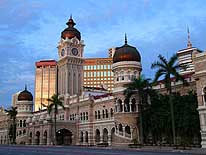
|
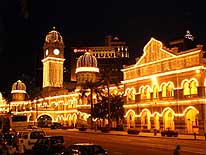
|
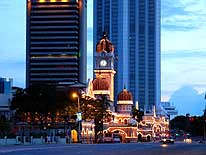
|
- The colonial style building of
- Sultan Abdul Samad by day .......
|
- ……. and by night glittering in the
- glow of a thousand lights …….
|
- ….… and contrasting against the new
- modern glass palaces in the background
|
| September
23rd, 2005:
Kuala Lumpur with a touch of “1001-nights”
As we integrate into the heavy traffic towards Kuala Lumpur, our sweat is running
continuously. Luck has it that already on our second day we meet Peggy and Philippe –
she Malay, he Swiss. When they realize that we are sleeping in our car, Peggy suddenly
comes up with an idea: “Do you not want to stay for a change in a hotel instead of
sleeping in your car in this heat? I know the director of a first class hotel in the heart
of downtown and can try to get a good price for you.” Firstly, we are not so keen to
spend any money for a hotel accommodation. But after a while, we find the proposal not
anymore so objectionable. Why not, if the rate is acceptable, and tomorrow is anyway my
birthday? It just needs one single phone call to weaken us. Everything seems to be
attractive – safe parking for our car in the basement, an air-conditioned room with
TV, fridge and coffee making possibility sounds good too, and the price of US$24 per day -
including a rich breakfast buffet - is acceptable [much to Emil’s regret though,
there is neither cheese (cheese products are not a very common sight in Southeast Asia)
nor ham (pork products are mostly not available in public restaurants due to Islam)]. We
check in the same evening into room No. 802 on the 8th floor of the AnCasa Hotel, with a
wonderful sight to the “jewels in the sky” – the TV tower and to one of the
two impressive Petronas-Twintowers. Moreover we receive free wireless internet from the
opposite Starbucks Coffee. This very comfortable accommodation suits us so far also, as we
intend to scan around 1’600 slides, which we had sent after us five months ago from
Switzerland to French Guiana. But they never reached its destination as long as we were in
the region. It was hard to accept that they might have been lost on the way. Many weeks
later, we received one of our happiest emails: Our friend Xavier in Cayenne informed us
that our “treasure” has just arrived and is now on his desk. He forwarded it by
DHL to Singapore.
|
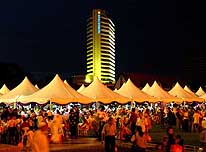
|
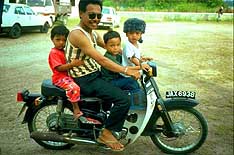
|
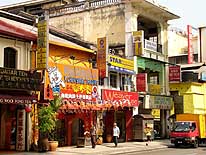
|
- A city of tents has been set up for a few
- hours at the Merdeka-Square for meals
- and hampers for the handicapped and low
- income people; around 5’000 attended
|
- A family on a motorbike ride
|
- One of the many colorful corners
- in Kuala Lumpur’s Chinatown
|
| Kuala Lumpur, the capital of
Malaysia, is a charming city with Moorish and English colonial style buildings. It is like
wandering around in a wonderful open-air museum. Between all the high-rise buildings,
there is always something new to discover - traditional, historic or modern. One of the
most fascinating sight is the historic colonial town, where suddenly in the middle of
glass palaces an oriental building with arcades, domes and countless small minarets in
shining white, emerges. In its appealing architecture, it looks like a palace of
1001-nights, but it is the old Kuala Lumpur Railway Station. But also the oldest mosque of
the town, the Masjid Jamek, perched at the confluence of the Klang- and Gombak-Rivers -
the place of the first settlement – is not less enchanting. And at night - directly
from our hotel window - we can admire again the silvery face of the magnificent
Petronas-Twintowers and the many lights of the world’s fourth tallest TV tower, which
contrast wonderfully against the dark night sky. We always enjoy walking through the
lively and busy streets changing constantly from Chinese, Indian to Arab flair - it is an
experience of different worlds under the same hat. Luckily, we have to use our car only
rarely, as the traffic in Kuala Lumpur is not only chaotic but also difficult. There is no
accurate street map available, all seem to be immediately outdated due to the enormous
construction boom. It can easily happen that we find ourselves suddenly on a city-leaving
highway. I really admire my brave “driver” who can cope so easily with this
really demanding left-hand traffic despite of the many one-way streets and the bans to
make a right- or U-turn.
|
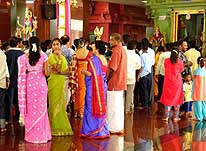
|
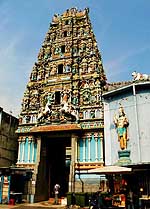
|
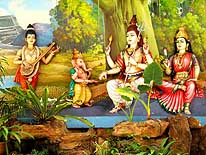
|
- During Deepavali, Indian families in their
- festive outfit gather for prayer at the
- Sri Maha Mariamman Hindu-Temple
|
- The Sri Maha Mariamman
- Hindu-Temple is packed
- with impressive statues
|
- Lovely scene of gods on a
- wall in the Sri Maha Mariamman
- Hindu-Temple
|
| November
1993:
Batu Caves - a famous Hindu Shrine
The bluish, smelly smoke from countless scooters, which take up the lead at a red light
and speed away simultaneously when it becomes green, stings in our eyes, as we head for
the Batu Caves, a famous Hindu Shrine, just 8 miles outside the capital. Through a richly
decorated portal, we make our way through 272 steep steps to the 120 million years old
cave set within a cool limestone outcrop, where Indian women in colorful Saris and brow
skinned Sikhs in their intriguing turbans make the offerings to their gods. Suddenly, a
close ear-deafening gunshot interrupts the stillness. What was that? Worried we look
around us only to discover with a smile that a guardian is chasing away the peaceful doves
on the square, which foul the holy place. They remember us to St. Peter’s Square in
Venice. There is just one thing that we regret today – that we are not here at the
right time when the annual Thaipusam Festival – one of the most important religious
celebrations of the Hindu’s - takes place each January/February, which is said to
attract around 800’000 devotees. It must be amazing to see their masochistic-looking
rituals when some of them walk in trance with spikes through their cheeks and tongs to
their gods.
|
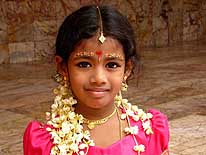
|
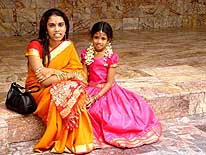
|
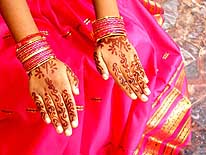
|
- Adorned with fresh jasmine flowers in
- the hair for the Deepavali Festival,
- which is celebrated as the triumph of
- good over evil, or light over darkness
|
- Exotic Indian beauties
|
- Her hands are decorated with Henna.
- Henna is used since centuries in
- India and the Middle East as a
- mean for adornments
|
| November
1993:
Escape to the cool highland, a river camp and start towards the North
The scoring heat of the last days brings most of the activities in the valleys to a
standstill and many people have the same aim as we have today – the cooler Genting
Highlands on an altitude of 5815 ft. Already the drive itself through lush green fern
trees, dense forest and flowering orchids is relaxing and refreshing. But what many
visitors are attracted to is the exclusive casino with its tempting air-conditioned
gambling halls. The prospect to cool us down makes us heading straight away to the entry
too. And, who knows, today might just come our lucky hour? We hardly can believe when the
resolute watchman refuses to let us in – wearing short sleeves we are not dressed
properly enough and therefore not allowed in. Any arguing is wasted time; he insists that
this is the rule. His stubbornness gets on our nerves so much that we rather give it a
miss than to change our cloths. Instead, we take the chance to wander around the extensive
theme park surrounding it, before we dive from the coolness back into the tropical heat
again. And before the day ends, it becomes nevertheless our lucky day. Shortly before
Kuala Kubu Bahru, we discover a secluded piece of land at a quiet mountain river. Huge,
colorful butterflies fly around us and exotic flowers bloom everywhere. At the river
embankment, we are thrilled to spot the rare, “carnivorous Pitcher Plant”, which
with its sweet nectar lures insects into its “urn” and closes the lid, once the
victim is entangled.
|
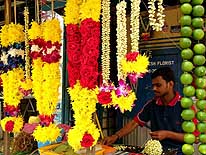
|
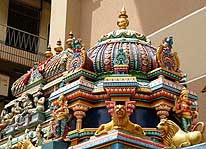
|
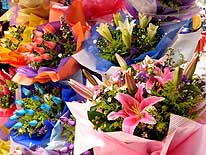
|
- Garlands of fresh flowers are
- skillfully made and sold in
- front of every Hindu Temple
|
- One of the richly sculptured
- corners in the interior
- of the Hindu Temple
|
- During Deepavali celebrations, families
- decorate often their homes with flowers.
- Beautiful bouquets are sold all over
|
| Laundering in the quiet river,
drying the clothes between tropical showers, cleaning and reorganizing our car’s
content, repairing the exhaust pipe with empty tin cans, writing letters to relatives and
friends, tanning and bathing, reading - just relaxing, cooking something and enjoying a
beer – from one day it becomes two, then four and then eight. Besides the daily visit
of an always-hungry dog, we have the whole idyllic site completely to ourselves. Only on
the weekend it gets busy with people who park their cars here and then cross the river
with their backpacks and ropes to climb to the jungle cascades, which are about an hour
walking distance away. One night, heavy tropical rain pours on our car roof and changes
our usually peacefully running river in the shortest of time into a gigantic, wildly
roaring monster. Until the morning, the water level rises alarmingly and soon escapes its
bed. Where yesterday we bathed joyfully and did laundry, masses of brown water, uprooted
trees and broken branches make their way downstream - an enormous and at the same time
terrifying spectacle of the nature. But as quick as it started, as fast it stops again.
Mid-afternoon, the eerie cloud formations disappear suddenly, the high water level
decreases and the hot sun absorbs slowly also the mist. Only from the giant, evergreen
treetops it continues to drip.
Everything became extremely humid inside our LandCuriser, thus we decide to move further
North to the Sam Poh Tong Cave Temples near Ipoh, nestling between bizarre limestone
formations. Immediately we get swept away by its beauty – by the tiny pagodas,
playful pavilions sitting between lovely ponds, the turtle basin standing for luck and the
elaborated entrances, cut into the rock. Impressive Buddha’s and altars overloaded
with offerings decorate this holy place. A similar wonderful sight is the Perak Tong Cave
Temple with its beautiful wall paintings, which was built in 1926 by a Chinese monk. Most
impressive are the over 40 oversized Buddha’s which throne between stalactites and
stalagmites. Its masterpiece - the sitting Buddha - is 42 ft. tall. 385 steep steps inside
the cave bring us finally to the top of the hill, from where we have a beautiful view over
the fertile valley and the smoking tin-mine chimneys – a sign of the rich tin-mining
activity.
|
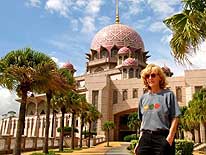
|
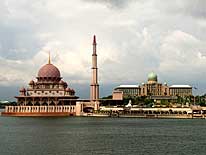
|
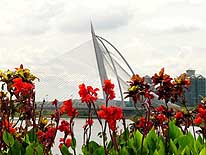
|
- The modern Putra Mosque with its pink
- dome is the “jewel” of the new govern-
- ment seat in Putrajaya, built 20 miles
- outside of Kuala Lumpur. It can accom-
- modate up to 10’000 worshippers
|
- The Perdana Putra complex
- next to the mosque is the new
- government seat in futuristic Putrajaya
|
- One of the modern, newly
- built bridges in Putrajaya
|
| November
1993:
Holiday island of Penang and heading towards the Thailand border
The more than eight miles long bridge, once the third longest of the world, connects the
holiday island of Penang with the tropical mainland. Our first impression of this holiday
destination is not very impressive – high rise buildings of hotel resorts make any
car access to the white sandy beaches practically impossible. There is absolute no chance
for us to find a spot near the seashore, where we could camp. Disappointed, we decide to
follow a narrow track, which winds its way through impenetrable rainforest towards the
hilltop. But there is no way to pull out at any time; all other tracks, even the overgrown
ones, lead to houses. In the pale evening light, we finally reach the highest peak of the
island and enjoy the sight of palm trees stretching straight down to the sea. But also
here, there is no way to spend the night. It is almost dark and we have surrounded nearly
the whole island, when we finally discover a forest clearance along the road close to the
Teluk Bahang beach, where we decide to park for the night. It is magic to see the flashing
of the many fire flies in the trees, which we first wrongly take for torches. Or were
there also some flashlights around? Some days later, we suddenly start to question it when
we talk to a local family we meet at the beach and ask them where they live. Much to our
embarrassment they reply: “We are your neighbors – we live not far from your
night camp!” And we were so absolutely convinced that we were “perfectly
hidden”!
|
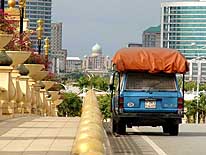
|
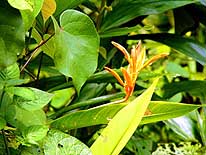
|
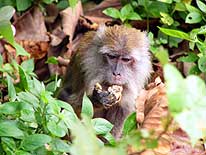
|
- On a sightseeing tour in Putrajaya
- with our LandCruiser
|
- A tropical flower at the road side .......
|
- ….... and a monkey on a tree
|
| The Chinese charm of Georgetown,
Penang’s capital, is everywhere and the splendor of the many Far East temples is
enormous. Bold Buddhist monks are praying and singing to the many gods of the Kek Lok Si
Temple in Air Itam on the foot of the Penang Hills, as we arrive. One monk is writing the
names of visitors in Chinese on tiles, which will be then used in future buildings –
of course against a small contribution. We are standing in front of the biggest Buddhist
pagoda in Southeast Asia. The seven-storey, 100 ft. tall pagoda of the 10’000 Buddha
– is a mixture of Chinese, Thai and Burmese architecture showing beautiful exotic
details. We proclaim it “our” most beautiful holy site in this city, although
more marvelous temples are spread all over– so also the Thai Wat Chayamangkalaram
with its 108 ft. long sleeping Buddha, the third biggest lying Buddha in the world. He is
flanked by two dozens of golden deities. The hills of Penang are covered in dark clouds,
as the car ferry carries us back to the mainland and we take the highway towards Thailand.
Soon, fertile, lush carpets of rice fields in different growth reach to the horizon –
a beautiful sight. Farmers with wide hats are standing knee-deep in the water, cultivating
with bended backs their fields. Evening is approaching, and the sun starts already to
disappear with an intensive red fireball behind Langkawi Island, when we finally reach a
beach at low tide, where local people are digging for shells. It is just the perfect place
to spend the night. And for me as a passionate shell collector, this shell-covered beach
is a big temptation, much to Emil’s distress though, as they are filling more and
more our already heavily overloaded LandCruiser!
|
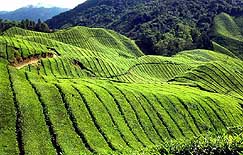
|
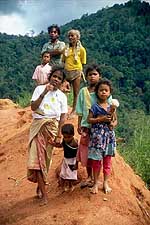
|
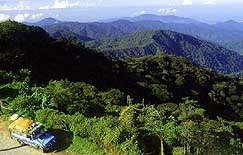
|
- Lush green tea plantations
- in the Cameron Highlands
|
- This family of aborigines sells fruits
- along the road to the Cameron Highlands
|
- The Cameron Highlands are still
- surrounded with hills covered with jungle
|
- January 1994:
Returning from Thailand – heading South again through the less touched Northeast
Due to the extremely heavy monsoon rains of this year, over a hundred land slides have
damaged very hardly the winding mountain road from the Thailand border town of Betong to
Kota Bharu in the most conservative province Kelantan. Everywhere, road repair work is on
the way and for security reasons, even driving in the night is prohibited. Dams and dense
forest are the main attractions on our way South. Shortly before we reach the tourist
resort of Banding on the Temengor Lake, we discover with dismay that oil is leaking from
the rear axle what means that its shaft is worn out. We need a spot to replace it - there
is no way we can continue for long. Once again we are very lucky: Not far away, we
discover in the woods at the lakeshore a still unbroken and not yet overgrown concrete
base of a demolished house. It is just what we need - we could not have found a better
site to camp. While we replace a new axle, we are surrounded by a wealth of jungle noises.
And at night, we hear the cracking of branches from wild pigs roaming through the bushes.
Unfortunately, we do not manage to see wild elephants, which – according to a warning
sign – should come here to drink.
-
|
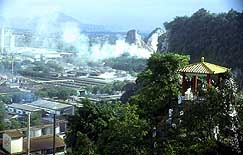
|
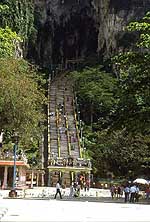
|
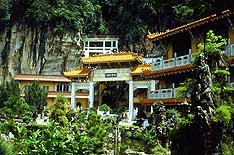
|
- View from the pavilion of the
- Sam Poh Tong Caves to the
- tin mining town of Ipoh
|
- The Batu Caves, a Hindu shrine, are located
- in a huge limestone outcrop and reached
- by 252 steep steps. During the famous
- Thaipusam Festival, there are incredible
- scenes of masochism
|
- Temple caves of Sam Poh Tong
- in the South of Ipoh
|
| Next morning, two 4x4 vehicles
arrive and two well-dressed Chinese businessmen start to load carefully bundled bamboo
sticks, which we have seen lying along the seashore. Then they wait – what for? All
at a sudden, small fishing boats with short men of dark skin, curly hair and flat noses
– remembering us in a way the aborigines of Australia – come ashore, bringing
more material from the forest. They are Orang Aslis, Malaysia’s aboriginals, living
in the forests surrounding the dam. While their merchandise is exchanged against diesel,
food and other items, we keep low profile at distance. Trading this way, still about
3’000 living Orang Aslis get the essential necessities for their life, which the
jungle cannot provide. Apparently, the government wanted to force their dislocation
several times, but this “people of nature” always returned to their beloved
world and their natural way of life again.
Screaming monkeys from the other seashore awaken us next morning. Suddenly a motorbike
with two guys is speeding straightaway towards us. “Might we get troubles?” One
is a policeman, who introduces himself as “Smile” (nickname for Ismail), what he
practices widely. The other one is the owner of the fishing company, on which private
property we apparently are camping and for which we would have needed a permit. Of course,
they want an explanation, why we are staying here already for days. Luckily both of them
are kind: “It is not a problem at all”, they explain us in pretty good English.
“We only wanted to check, who you are”. Still, for us it is a little hint that
it is time to move on – towards Kota Bharu.
|
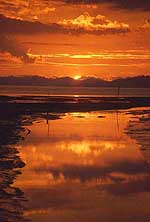
|
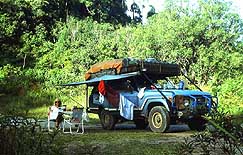
|
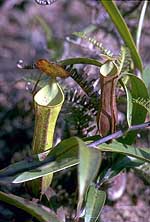
|
- Sunset over tropical Langkawi
- Island near Kuala Perlis
|
- Our idyllic camping spot on a
- jungle river near Kota Kubu Bahru
|
- The rare “carnivorous Pitchers Plant”
- uses its sweet nectar to lure insects
- to its “urn” and closes the lid once
- the victim is entangled
|
| February
1994:
Kota Bharu and the tea plantations of the Cameron Highlands
The roofed central market of Kota Bharu spreads a range of bright colors and strange
smells, engaging all our senses. The rich choice of products is a delight for our eyes:
Mountains of red chili, green vegetables fresh from the fields, tropical fruits like
guava, mango, papaw, pineapples and rambutan, mixed with exotic spices, roots, fresh fish
and all kinds of agricultural products. Not only is their display on the long wooden
counters colorful, but also the Moslem women in their special outfit, who are sitting in
the middle of their foodstuff and have also the reputation of being very smart doing
business.
Tobacco fields with huge, thick leafs are the main sight on our way South. Again and
again, small roads branch off to remote, lonely sandy beaches. We take many of them, but
stay at none. With their dilapidated straw huts, the huge quantity of garbage floating
ashore, the steady heavy waves, dense salt-water spray and the persistent strong wind,
they are not very inviting. Despite of that, always groups of youngsters - curious scooter
drivers – follow and approach us – day and night. In Rantau Abang in Terengganu
we visit the breeding place of the giant turtles, which come ashore between May and
September. It is rather a disappointing sight – nothing has an original appearance
anymore. New bungalows have been built for turtle watching, and as a result kept away more
and more of these sea creatures which are close to distinction.
|
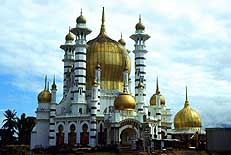
|
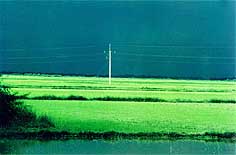
|
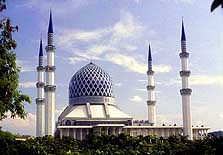
|
- The Ubudiah Mosque in Kuala Kangsar
- has the reputation to be the most
- beautiful mosque in Malaysia
|
- Rice field in Perlis with an
- approaching thunderstorm
|
- The four minarets of the Sultan
- Salahuddin State Mosque in Shah Alam
- are visible already from far
|
| The Cameron Highlands with their
lush green tea plantations in different stages are our last station of this Asian country.
They are named after the British land surveyor William Cameron, who discovered them in
1885. Today they are one of the worldwide most famous cultivation regions of Ceylon tea.
Since generations, the labors are dark skinned Indians and Tamils from Sri Lanka. The
young women pickers with their huge baskets tied to the back give lovely, colorful
“spots” in the huge green fields. Along the way, under a canopy of shady palm
leafs, a local family sells the “king of fruit”, the spiky Durian, which smells
awfully (like old rotten cheese), but is appreciated as a delicacy. Yes, we tried it, but
it is definitely not our favorite taste. Because of its disturbing smell, this fruit is
neither allowed in subways nor in many hotel rooms. The sign: ”No Durian
allowed” is also placed in front of our hotel elevator in Kuala Lumpur.
|
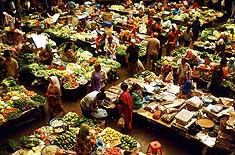
|
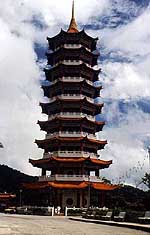
|
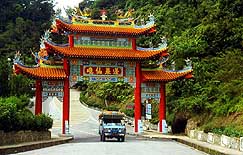
|
- The colorful central market in the
- Islamic town of Kota Bharu in
- Northeastern Kelantan
|
- Pagoda on the Genting Highlands
|
- Chinese Gate marking the entrance
- to the Genting Highlands
|
| October
2005:
Swiss Club of Malaysia and the Toyota LandCruiser Club of Malaysia
It is Friday, September 30th, 6.30 pm, as we wait in our LandCruiser in the practically
standing traffic from our hotel in Kuala Lumpur to the Euro Deli-Grillrestaurant. But not
only the traffic jam is enormous; equally enormous is the sudden appearance of the silvery
gleaming Petronas-Twintowers against the dark night sky. The many garden restaurants and
bars along the lovely, with countless red lanterns decorated streets, are bursting with
happy people. We, ourselves, have another, very special occasion to be on the road at
night with our own car: Mr. Thomas Stalder of the Swiss Consulate organized a gathering at
the Swiss Club, and our LandCruiser and we are the “special guests”. Of course,
we feel very privileged and extremely honored that also our Ambassador is among the many
guests. And when we spot “sausage and cheese salad” on the menu card - one of
our earlier most favorite home dishes - our eyes start to shine even more intensively. The
evening is long, very interesting and very animated, and midnight is over before we can
talk to each one personally. Before everybody leaves, we take the chance to explain our
“house” and are taken totally by surprise when Thomas Stalder presents us an
attractive “certificate” for a tank filling of our LandCruiser. What a great
gesture - thank you very much indeed, Swiss Club of Malaysia! The heavy traffic has eased
when we return to our hotel and slip tired, but happy about the lovely hours with our
countrymen, into our white, clean sheets.
|
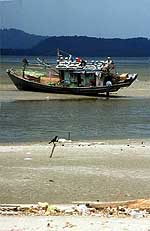
|
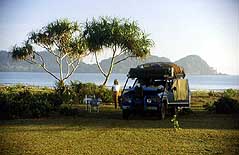
|
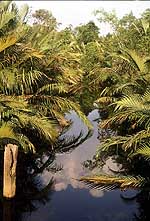
|
- Traditional junk in the port of
- Mersing in the South China Sea
|
- Our little camping paradise at Tanjong Resang
- North of Mersing at the East Coast
|
- Palm fringed river on the East Coast
- of the peninsula of Malaysia
|
| Two weeks later, again on a
Friday, we experience another fortunate day in Malaysia. We find ourselves in relaxed
company with members of the Toyota LandCruiser Club, enjoying a delicious Chinese lunch in
a restaurant near their clubhouse. They all have an adventurous spirit, having made many
overland expeditions with their team - sponsored by the Malaysian oil company Petronas. Of
course, we have a lot of common ground to talk about and one afternoon is not enough.
Therefore, Charley, the president, invites us spontaneously to the Renaissance Hotel for a
dinner in style together with other club members and their spouses. Without knowing it, he
coincidentally hits the date of our 21st Travel Anniversary. At some point, we mention it,
with the result that for desert we get a delicious birthday cake “21 years on the
run…” , offered by the hotel management. But this is only the beginning. The
LandCruiser Club makes the first steps to rejuvenate our “travel beaten
“companion. During the following days, he gets a new muffler and some bodywork done.
And we have the chance to spend many more interesting hours in their company, either in
Stivens 4x4 Shoppe & Service place – which is also their clubhouse - or in the
Chinese Restaurant with the delicious food. Steven, the club’s secretary, one day
chokes: “Are we actually a 4x4-Club or an Eating Club!”
|
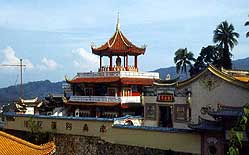
|
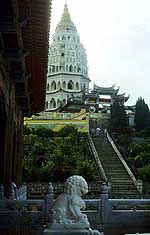
|
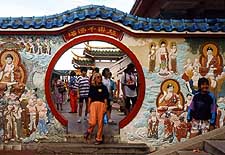
|
- Pavilion of Kek Lok Si Temple in
- Georgetown – the main town
- on the island of Penang
|
- In the interior of the Kek Lok Si
- temple in Georgetown
- on the island of Penang
|
- Liliana passing through the gate of the
- Kek Lok Si Temple in Georgetown
- on the island of Penang
|
| We always seem to find a new
reason why we have to postpone our departure from Kuala Lumpur, which we enjoyed in many
ways. First, we wanted to finish our mega job of scanning over 1’600 slides and have
more bodywork done on our LandCruiser. Then, on November 1st, Deepavali, the Indian
Festival of Lights, is holding us back, and two days later it is Hari Raya Aidilfitri, the
end of the Ramadan, the Moslem fasting month. Then we still want to visit Putrajaya, the
new government seat. It is an overwhelming sight with its pompous palaces of different
architecture spread over a vast area, surrounded by beautifully manicured and flowering
gardens, lakes and hypermodern and “royal” bridges. In some parts, the oriental
details transfer us into deep Arabia, which for us always has its fascination. But as it
is with Brasilia, the new capital of Brazil, it is sterile, lacks of life and is a kind of
a ghost town where nobody really wants to live. Many people are of the opinion that it is
just a prestige object and a waste of money. When we return to our AnCasa Hotel in the
evening, our hearts open up again. This region is the place where we experience and enjoy
the real Malaysian life at its most - the colorful melting pot of Malay, Chinese and
Indian cultures with their distinctive food, smell and sound. And it is from here that we
shall treasure our most intensive moments of Malaysia.
|
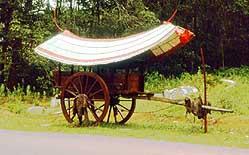
|
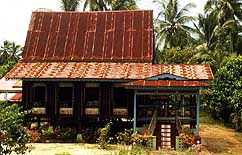
|
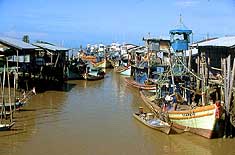
|
- A traditional ox chart along
- a street in Malacca
|
- Typical features of a traditional Malacca
- house are the big gable roof and the
- tiled steps leading to an airy veranda
|
- Fishing Village of Kuala Perlis
- on the West Coast near the
- border of Thailand
|
| Before a new reason pops up on
the horizon, we definitely give us a kick to start running our shut down
“machine” again: On November 11th, we continue towards Thailand. We certainly do
not mind to leave behind the enormous air pollution, the constant stop and go traffic and
especially also the unbearable heat. But we definitely will miss the hearty contact to our
new friends Peggy and Philippe, who made so many positive things happen and cared so much
for us. We will also miss our supportive Embassy and the generous Toyota LandCruiser Club.
And last, but not least we are also sad to say good-by to our extended luxury life in the
1st class AnCasa Hotel with the rich breakfast buffet, the fresh orchids on the table, the
daily new sheets, the newspaper delivered to our room, the central location and over all
the friendly staff, who made us feel so wonderfully at home. Thanks to the generous
Manager, who at the beginning of Ramadan – the Moslem holy month – offered us a
free stay of two weeks and extended it step by step, we were allowed to enjoy all the
comfort for over a month.
Selamat tinggal! – Good-bye! Who knows, we might come back again!
|
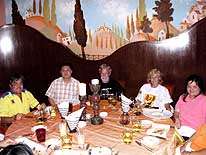
|
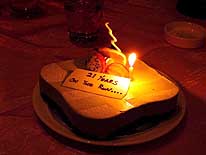
|
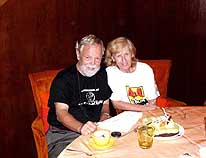
|
- October 18th, 2005:
|
- Celebration of our 21st Travel
- Anniversary in the Renaissance Hotel
- together with members of the
- LandCruiser Club of Malaysia …….
|
- ….... the birthday cake
- "21 years on the run ...." .......
|
- ….... and the happy „crazy“ travelers
- after having driven within 15'800
- driving hours nearly 370'000 miles
- through 150 different countries
|
|
|
